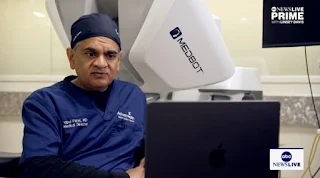 |
| Photo/abc |
A Doctor in Florida, USA, has successfully conducted surgery on a cancer patient situated thousands of miles away in Angola, Africa, utilizing a robotic system.
Vipul Patel, the medical director of the Global Robotic Institute at Advent Health in Orlando, performed a prostatectomy—surgery that involves the removal of part or all of the prostate—on Fernando da Silva from Angola, as reported by ABC News medical correspondent Dr. Darien Sutton on Tuesday, June 17.
Da Silva, aged 67, was diagnosed with prostate cancer in March, and in June, Patel employed transcontinental robotic telesurgery to excise the cancerous tissue.
Prostate cancer is highly prevalent in Africa, Patel informed the Network, adding, “In the past, they really haven’t monitored it well or they haven’t had treatments.”
The Doctor stated that this surgery was a long-awaited achievement, and it was successful.
“We’ve been working on this really for two years,” Patel remarked. "We traveled the globe, searching for the right technologies."
Da Silva was the first patient in a human clinical trial sanctioned by the Food and Drug Administration to evaluate this technology.
Surgeons have previously utilized a multimillion-dollar robot to operate on patients with “enhanced visuals and nimble controls,” as reported by ABC News, but they are typically in close proximity to their patients while operating the machine.
Patel employed fiber optic cables to test the technology from a considerable distance away from his patient. “There was no perceptible delay in my brain,” the physician stated.
His surgical team was present in the operating room with Da Silva, ready to intervene if necessary.
"We ensured we had plan A, B, C, and D. I always have my team where the patient is," the physician explained.
In the event of any issues with the telecommunications, "the team would just take over and finish the case and do it safely,” he added.
Reflecting on the surgery, Patel described it as “a small step for a surgeon, but it was a huge leap for health care.”
He emphasized that the “humanitarian implications are enormous.”The doctor highlighted the significant number of underserved regions globally, adding that rural areas in the United States could also greatly benefit from advanced technology. He elaborated on the potential for emergency room physicians to utilize remote access technology, allowing surgeons to provide interventions even in ambulances, thereby assisting patients who are unable to reach a hospital in time. Patel expressed his intention to submit the surgical data he gathered to the FDA, aiming to expand the use of telesurgeries in the future.
